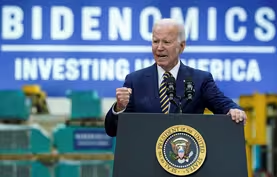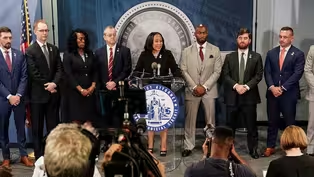
A look at life in Afghanistan after 2 years of Taliban rule
Clip: 8/15/2023 | 11m 9sVideo has Closed Captions
Life in Afghanistan remains dire 2 years after collapse of U.S.-backed government
Two years ago Tuesday, Taliban fighters poured into Afghanistan's capital and the army melted away and President Ashraf Ghani fled for his life. The country that the U.S. and NATO spent nearly 20 years fighting to build was suddenly controlled again by the same Taliban whom the U.S. deposed after 9/11. Nick Schifrin looks back on the anniversary with Nader Nadery and Laurel Miller.
Problems playing video? | Closed Captioning Feedback
Problems playing video? | Closed Captioning Feedback
Major corporate funding for the PBS News Hour is provided by BDO, BNSF, Consumer Cellular, American Cruise Lines, and Raymond James. Funding for the PBS NewsHour Weekend is provided by...

A look at life in Afghanistan after 2 years of Taliban rule
Clip: 8/15/2023 | 11m 9sVideo has Closed Captions
Two years ago Tuesday, Taliban fighters poured into Afghanistan's capital and the army melted away and President Ashraf Ghani fled for his life. The country that the U.S. and NATO spent nearly 20 years fighting to build was suddenly controlled again by the same Taliban whom the U.S. deposed after 9/11. Nick Schifrin looks back on the anniversary with Nader Nadery and Laurel Miller.
Problems playing video? | Closed Captioning Feedback
How to Watch PBS News Hour
PBS News Hour is available to stream on pbs.org and the free PBS App, available on iPhone, Apple TV, Android TV, Android smartphones, Amazon Fire TV, Amazon Fire Tablet, Roku, Samsung Smart TV, and Vizio.
Providing Support for PBS.org
Learn Moreabout PBS online sponsorshipGEOFF BENNETT: Two years ago today, Taliban fighters poured into Afghanistan's capital, Kabul.
The army melted away, and President Ashraf Ghani fled for his life.
The country that the U.S. and NATO spent nearly 20 years fighting to build was suddenly controlled again by the same Taliban whom the U.S. deposed after 9/11.
Nick Schifrin is back from parental leave, and looks back on this anniversary and today's Afghanistan.
NICK SCHIFRIN: After nearly two decades of combat, American sacrifice and more than 100,000 Afghan lives, the Taliban didn't have to fire a shot.
They recaptured Kabul on August 15.
And the multinational, multi-trillion-dollar war ended with chaos.
Tens of thousands of Afghan swarmed Kabul's airport.
Some preferred to cling to a moving plane than live under Taliban rule.
And the last U.S. soldier and general commanding the evacuation left under the cover of darkness.
The top U.S. military official called it strategic defeat.
Today, Taliban police patrol the capital they rule and say violence has largely been silenced.
But so have women.
Last month, a group braved Taliban gunshots to demand change.
Afghan women today are barred from secondary education and most forms of employment.
They're prohibited from working for the U.N. and nongovernmental organizations, and they're blocked for most public spaces.
The U.N. calls it gender-based apartheid.
Most recently, the Taliban ordered beauty salons shut down.
Aziz works in secret to feed her desperate family.
MRS. AZIZ, Makeup Artist (through translator): We are jobless.
Possibly, we might flee, because there is no work, no income for me in this country.
My children are hungry.
NICK SCHIFRIN: The U.N. says 20 million Afghans are hungry and more than two-thirds need aid to survive.
The U.S. is the single largest donor of humanitarian aid.
But it keeps $3.5 billion in foreign reserves frozen and refuses to open an embassy in Kabul, where, today, the Taliban celebrated their prize, a country where even the youngest lives under their version of Islamic law.
Today, the U.N. said that, while the country is much less violent today than before 2021, more than 1,000 civilians have died in bombings and other violence.
For more than the situation in Afghanistan and U.S. policy toward the Taliban, we get two views.
Nader Nadery is former commissioner of the Afghan Independent Human Rights Commission.
He's now a senior fellow at the Wilson Center, a Washington-based think tank.
And Laurel Miller was former President Obama's special representative for Afghanistan and Pakistan.
She's now president and chief executive officer of the Asia Foundation, a nonprofit development organization.
Thanks very much.
Welcome both of you back to the "NewsHour."
LAUREL MILLER, Former State Department Official: Thank you.
NICK SCHIFRIN: Here's the Taliban narrative of Afghanistan today, no significant opposition, no internal divisions, successfully targeting ISIS, and they're fighting corruption and reducing opium.
Nader Nadery, is that an accurate picture of Afghanistan today?
NADER NADERY, Former Senior Adviser to Afghan President: It is, to an extent, an accurate -- but the accuracy of that relates to, there is no political opposition, because it's an religious, authoritarian regime that does not allow any political views to be expressed.
If they express political view, if a citizen expressed different political view, will be ending up in jail, like an activist, Matiullah Wesa, who advocates for education.
(CROSSTALK) NADER NADERY: For four months.
He's still in education.
Other political leaders who have stayed beyond are being under house arrest and not allowed to be to be engaging in political activities.
Violence is low, yes, because Taliban are not blowing up any school or bridges.
That's true also.
They have -- they have eliminated a full-fledged military operation that they were carrying out to create chaos and violence and kill population.
So that's an accurate statement.
On the corruption, yes, that's true that they have reduced corruption at the custom duties, compared to what it was before.
But do not forget to watch on, as an example, the mining sector, what's happening there, the passport department, which one passport is charged $2,000 -- over $2,000 as a bribe.
And there are many other evidence of how corruption goes significantly and deep down.
NICK SCHIFRIN: Laurel Miller, is there also a sense of abandonment and Afghanistan, whether because of two years ago today or ongoing policies?
LAUREL MILLER: Well, I imagine there are some people in Afghanistan who feel that way.
I don't think it's the case that there is wholesale abandonment of Afghanistan.
There's been significant humanitarian aid that's been provided to alleviate the humanitarian crisis there, and the U.S. has been the biggest contributor to humanitarian aid.
That's declining.
And it's not enough to put Afghanistan back on its feet.
But within the context of having fought a 20-year war, and lost that war, the fact that the United States is even to some extent pragmatically engaged with Afghanistan, and that other Western governments are as well, that some countries have reopened embassies there is rather remarkable in historical perspective.
NICK SCHIFRIN: Engagement with Afghanistan, of course, means engagement with the Taliban.
In late July, U.S. officials met with the Taliban and -- quote -- "urged the Taliban to reverse its policies on women."
And, today, Secretary of State Antony Blinken explicitly linked normalization with the Taliban to a change in behavior.
ANTONY BLINKEN, U.S. Secretary of State: The path to any more normal relationship between the Taliban and other countries will be blocked unless and until the rights of women and girls, among other things, are actually supported.
NICK SCHIFRIN: Nader Nadery, you have argued that pressure on the Taliban, not engagement, is the best way to help Afghans.
Why?
NADER NADERY: Because we have we have seen the Taliban have only known a path of pressure and consistency.
What they learned wrongly from the rest of international community is that they would stay on course on the positions, brutal, even if it is a very brutal position.
They would just stay on it.
However, they believed that any international community would slowly change their course and come to us because, in their view, the United States and the rest of international community need them for whatever reason.
It's a wrong perception and wrong and stunning.
NICK SCHIFRIN: That's how they... NADER NADERY: But that's how they have wrongly learned through the negotiation, the U.S. and them in 2019.
NICK SCHIFRIN: During the Trump administration with Zalmay Khalilzad, yes.
NADER NADERY: Of course, when you look at the level of concession they have received from the United States, that's how they learn that they can stay on course.
And that's what they say in their public statements.
So what Secretary Blinken said is very much encouraging that addresses one key issue that the United States and the rest of international community has left only with one leverage, to make the Taliban to adhere to some of the promises they have made or to brutalize less its -- their own population.
And that is to not recognize them.
But there is one additional, if I may, point.
And that is, the Taliban would only hear and act if the United States goes even further drastically and called for Taliban are not respecting the Doha deal, elements of the Doha deal.
The United States could... NICK SCHIFRIN: Doha deal between the Trump administration and the Taliban, right.
NADER NADERY: The Trump administration and the Taliban.
So, the United States could say, unless they respect it, the Doha deal will be nullified.
NICK SCHIFRIN: Laurel Miller, more pressure?
Does the U.S. have leverage over the Taliban?
LAUREL MILLER: I don't think there's much leverage at all.
In fact, there's a lot less leverage for shaping Taliban behavior now than there was over 20 years of waging war in Afghanistan.
And that didn't effectively shape Taliban behavior, as we see today.
It's -- I think you can see the Taliban having learned the lesson over 20 years that consistency on their part does gain their - - enables them to achieve their objectives.
And they did achieve their objectives.
NICK SCHIFRIN: And, Nader Nadery, it seems that when the supreme leader, Hibatullah, claims that life for Afghan women have has improved under the Taliban, it seems difficult, though, to convince them to change their policies, right?
NADER NADERY: Absolutely, 68 edicts and policies and rulings that systematically restricts women and eliminates their -- any role, social and political and public life, is aimed toward complete control of the woman's life in Afghanistan.
And I very much support the call for recognizing gender apartheid as an international crime, as a crime against humanity.
Our international community's conscience needs to be shaken as it was during the apartheid regime of South Africa.
It's not only the half of the population, the 18 million Afghan women, that are being bought and denied every single fundamental rights.
But it's about the humanity as large, what kind of example we are going to allow to be implemented in a country that has turned to a big present against women.
NICK SCHIFRIN: But, Laurel Miller, can the humanitarian aid be used as leverage?
Can there be some point that the U.S. uses in order to try and get that reality changed?
LAUREL MILLER: Yes, humanitarian aid cannot and should not be used as political leverage.
That would violate enormously important humanitarian principles.
There's no real diplomatic leverage over the Taliban.
I mean, yes, it's true that the United States and other governments can withhold full recognition of the government, can deny the Taliban the opportunity to hold the seat in the U.N.
But I think that we're seeing the evidence that the Taliban has other priorities.
Although they probably would prefer to have diplomatic recognition and the U.N. seat, they're prepared to live without that because they prioritized issuing the kind of edicts that Nader pointed out.
NICK SCHIFRIN: Laurel Miller, Nader Nadery, thank you very much.
LAUREL MILLER: Thank you.
NADER NADERY: Thank you.
Biden takes economic message on the road
Video has Closed Captions
Clip: 8/15/2023 | 5m 57s | Biden takes economic message on the road amid questions about his re-election campaign (5m 57s)
Breaking down the charges Trump faces in Georgia
Video has Closed Captions
Clip: 8/15/2023 | 9m 9s | Breaking down the charges Trump and 18 allies face in Georgia election case (9m 9s)
Daughters of American held in Iran discuss his imprisonment
Video has Closed Captions
Clip: 8/15/2023 | 7m 28s | Daughters of American held in Iran discuss his 5-year confinement and move to house arrest (7m 28s)
What's next for Trump after his 4th criminal indictment
Video has Closed Captions
Clip: 8/15/2023 | 3m 24s | What's next for Trump after his 4th criminal indictment (3m 24s)
Young activists win climate change lawsuit against Montana
Video has Closed Captions
Clip: 8/15/2023 | 3m 18s | Young activists in Montana win landmark climate change lawsuit against state (3m 18s)
Providing Support for PBS.org
Learn Moreabout PBS online sponsorship
- News and Public Affairs

FRONTLINE is investigative journalism that questions, explains and changes our world.

- News and Public Affairs

Amanpour and Company features conversations with leaders and decision makers.












Support for PBS provided by:
Major corporate funding for the PBS News Hour is provided by BDO, BNSF, Consumer Cellular, American Cruise Lines, and Raymond James. Funding for the PBS NewsHour Weekend is provided by...




